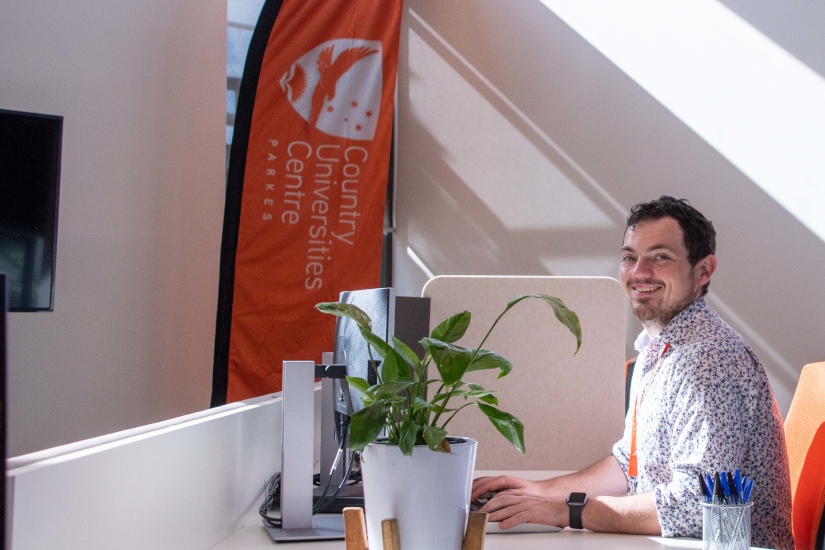R U OK? We are all ready to ask, but who is ready to answer?
09 Sep 2021
My name is Jacob Cass, Centre Manager of the Country Universities Centre in Parkes. This ‘R U OK Day’ I want to encourage you to ask this question but also be prepared to answer as well.
You may be thinking, “I am always answering this question, to my mates, to my colleagues and to my family.” But today is different. Today we are asking you to reflect. We are asking you to answer this question with a whole and honest heart.
When I graduated from University, I moved half a state away from my family for a full-time job. No support, a new town and my first time living alone. This affected me. I was anxious. I was depressed. If you asked me how I was going I would respond with “livin’ the dream.”
I lived that dream all the way from a healthy 90kg 18-year-old man to a rather unhealthy 180kg 25-year-old man, and I never spoke up. I ate my feelings. I never sought help. Although those around me often asked, “how are you travelling?” or “How are things going?” I was never prepared to answer honestly.
Not only did my weight suffer, but my blood pressure skyrocketed. My sleep suffered. I withdrew socially. My relationships suffered. I missed job opportunities and finally, at 24 years old, I spent the night in Parkes Hospital, where I mistook a panic attack for a cardiac episode.
I lived in fear that I wouldn’t see 30, I would never have a family of my own and that I had gone down the rabbit hole too far to ever recover.
At 25, my then manager and now good friend pulled me aside and laid it out for me. Even though I was not prepared to answer the question, those around me could see the signs, and they cared enough to want to help me. I was scared to reach out but in hind sight I did not need to be scared.
I look back now at the age of 28. Three years of hard work saw me loose nearly 100kg and get a new career. I could never have imagined at 25 so many achievements under my belt.
I think how much easier things could have been, if I had been prepared to answer that question. “Jacob, are you ok?”.

On this day, we look to our loved ones, our friends and work colleagues, and we ask that vital question. But it’s time to go deeper this year. In 2021 we have been dealing with a global pandemic and its repercussions. Our reality is, it is ok to not be ok and it is ok to answer honestly.
Now you may be thinking, “what do I do when my loved ones answer honestly? How do I help them?” The good news is it is not all on you. If you are in a good place yourself and feel you can ask the question, the RUOK team have some tips to help you.
RUOK support information
Want to know how to ask R U OK? Day is all about reaching out to those we care about and checking in. Click here to learn more about when and how to ask R U OK?
Find your university well-being support
If you need extra well-being support your university has online, in person, and phone support services available to help you get back on balance. Access your university well-being support page here linktr.ee/cucstudentwellbeing or reach out helpful professional health services below.
Professional Health and Well-being Services
Head to Health (H2H)
H2H is a website that aims to help people find good mental health and wellbeing information, resources, and links to online and phone mental health services all in one place. It supports people seeking help, either for themselves or someone they care about. To find out more; headtohealth.gov.au/
Headspace
Headspace is the national youth mental health foundation dedicated to improving the wellbeing of young Australians. Their website provides information and resources on mental health, physical health, work, support, study support, and alcohol and drug services. Support for young people, their family and friends can be accessed through this website including finding a local headspace centre, online/phone counselling service headspace, and the digital work and study service. To find out more; headspace.org.au/ or to find a Headspace Centre in your local area please see this map: headspace.org.au/headspace-centres/
Beyondblue
Beyondblue is an organisation that provides information, and support for, depression, anxiety, and suicide prevention. This website contains information, resources, and services for depression. To find out more; beyondblue.org.au/
The Black Dog
This website has up to date information and resources on mental illness, online self-testing, current treatments and wellbeing. The institute aims to reduce the incidence of mental illness and the stigma around it, actively reduce suicide rates, and empower everyone to live the most mentally healthy lives possible. To find out more; blackdoginstitute.org.au/
The Desk
Thedesk is developed by The University of Queensland to support Australian tertiary students to achieve mental and physical health and wellbeing. Thedesk has free online modules, tools, quizzes, and advice that can help people improve their wellbeing and study more effectively. There are four modules that aim to assist students stay calm, be more productive, and improve their wellbeing and relationships. To find out more; thedesk.org.au/
Mood Gym
Mood Gym is a free online program designed to help people learn and practise skills to prevent and manage symptoms of depression and anxiety. It is like an interactive, online self-help book which teaches skills based on cognitive behaviour therapy. To find out more; moodgym.com.au/
MyCompass
myCompass is a free personalised self-help program developed by the Black Dog Institute for people with mild-to-moderate depression, anxiety, and stress. The program aims to help you recognise unhelpful thoughts, feelings, and behaviours, and develop skills to manage them based predominantly on cognitive behaviour therapy. To find out more; mycompass.org.au/
MindSpot
MindSpot is a free telephone and online service developed by Macquarie University for Australian adults experiencing symptoms of anxiety or depression. They offer free online or phone screening assessments to help you learn about your symptoms. You will then receive recommendations from a MindSpot therapist on free online MindSpot clinic treatment courses to help you recover, or local services that can help. Note: You must be eligible for Medicare-funded services in Australia to access Mindspot. To find out more; mindspot.org.au/

0 Comments
There are currently no comments, be the first to leave one